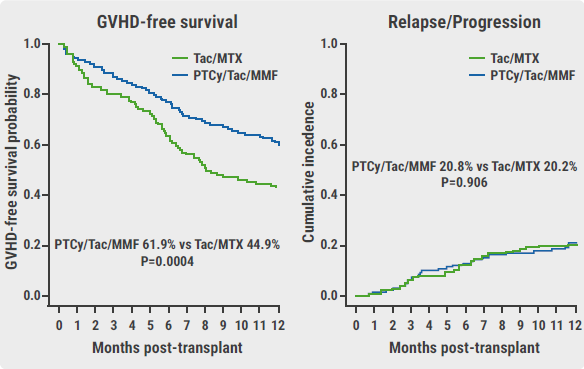https://doi.org/10.55788/fad0d3d1
“Genetic resistance to targeted therapies in cancer, and especially in haematological cancer, have been well characterised,” said Dr Nabih Maslah (Université Paris Cité, France). “The major mechanism of resistance that was revealed was point-mutation of the oncogenic target, but it was recently demonstrated that downstream activation of the target is another mechanism of resistance in FLT3-mutated acute myeloid leukaemia (AML) [1,2].” The current study investigated whether JAK inhibition with ruxolitinib promotes clonal evolution in MPN [3].
In a selection of patients with myelofibrosis and available molecular data of the St Louis cohort (n=73), ruxolitinib treatment was an independent factor of RAS pathway mutation acquisition (HR 9.8; 95% CI 1.2–78.9; P=0.031).
To answer the question whether ruxolitinib treatment initiates clonal selection of RAS-mutated cells, CD34-positive cells were cultivated from patients with primary MPN known to harbour RAS pathway mutations. After 10 days of treatment with ruxolitinib, in cells treated with the JAK inhibitor, there was an increase in RAS mutation variant allelic frequency (VAF) and this was associated with a decrease of the MPN driver mutation (JAK2, CALR, or MPL) VAF. This raised the issue of potential co-occurring RAS mutations and MPN driver mutations within the same clones. DNA single-cell sequencing subsequently showed that RAS mutations can be acquired in either a driver or a non-driver clone.
Furthermore, Dr Maslah showed data that ruxolitinib-treated MPN patients who harboured RAS pathway mutations had worse clinical outcomes than patients with unmutated MPN (decreased transformation-free survival: HR 6.7; 95% CI 19–23.2; P=0.003). In patients who did not receive ruxolitinib, this association was not observed. Approximately half of the ruxolitinib-treated patients transformed to AML or myelodysplastic syndrome (MDS), whereas only 1 out of 6 ruxolitinib-untreated patients transformed to AML or MDS [4,5].
These results were further investigated and corroborated in JAK-mutated cell lines and murine models. The authors suggest screening for RAS mutations before treatment with ruxolitinib to avoid this clonal evolution and subsequent negative clinical outcomes.
- Quek L, et al. Nat Med. 2018;24(8):1167–1177.
- McMahon CM, et al. Cancer Discov. 2019;9(8):1050–1063.
- Maslah N, et al. JAK Inhibition Mediates Clonal Selection of RAS Pathway Mutations in Myeloproliferative Neoplasms. Abstract 326, ASH 64th Annual Meeting, 10–13 December 2022, New Orleans, LA, USA.
- Santos FPS, et al. Leukemia. 2020;34(3):799–810.
- Coltro G, et al. Blood Adv. 2020;4(15):3677–3687.
Copyright ©2023 Medicom Medical Publishers
Posted on
Previous Article
« Ibrutinib added to ASCT improves clinical outcomes in mantle cell lymphoma Next Article
INCA033989: novel investigational agent for CALR-mutated MPN »
« Ibrutinib added to ASCT improves clinical outcomes in mantle cell lymphoma Next Article
INCA033989: novel investigational agent for CALR-mutated MPN »
Table of Contents: ASH 2022
Featured articles
Acute Lymphoblastic Leukaemia
Blinatumomab candidate for standard-of-care in newly diagnosed B-ALL
High-dose methotrexate or standard interim maintenance in young patients with ALL?
Acute Myeloid Leukaemia
Excellent results for triplet regimen in FLT3-mutated AML
MRD by qPCR prognostic of outcomes in venetoclax-treated NPM1-mutated AML
Promising results for triplet therapy with magrolimab in AML
Should we use intensive chemotherapy prior to allo-HCT in relapsed/refractory AML?
Chronic Leukaemia
Zanubrutinib wins battle of BTK inhibitors in relapsed or refractory CLL/SLL
Ibrutinib plus venetoclax displays long-term benefits in CLL
Multiple Myeloma
Talquetamab further investigated in heavily pre-treated MM after promising phase 2 data
Promising results of elranatamab for MM in phase 2 MagnetisMM-3 trial
Deep and durable responses for quadruple therapy in smouldering MM
Ultra-sensitive MRD assessment in MM with BloodFlow
CAR-Hematotox score proves useful in relapsed/refractory MM
Head-to-head: VMP versus Rd in transplant-ineligible MM
Lymphoma
Ibrutinib added to ASCT improves clinical outcomes in mantle cell lymphoma
High-dose chemotherapy plus ASCT superior to standard immuno-chemotherapy in primary CNS lymphoma
Odronextamab has considerable anti-tumour effects in relapsed/refractory diffuse large B-cell lymphoma and follicular lymphoma
Excellent results for AFM13-complexed NK cells in CD30-positive lymphoma
CAR-Hematotox score predicts toxicity, infections, and clinical outcomes in MCL
Myeloproliferative Neoplasms
Efgartigimod successful in immune thrombocytopenia
INCA033989: novel investigational agent for CALR-mutated MPN
Ruxolitinib mediates clonal evolution of RAS pathway mutations in MPN
Immune Thrombocytopenia
Long-term risk for haematologic disease in persistent, isolated mild thrombocytopenia
Various Topics
C1 inhibitor deficiency linked to thrombosis
Durable responses to gene therapy in haemophilia A
Long-term benefits from beti-cel in transfusion-dependent β-thalassaemia
Neutrodiet: non-restricted diet is the preferred option after SCT
Iptacopan offers solution for patients with PNH and residual anaemia after standard-of-care
Novel therapy may replace standard-of-care prophylaxis for GVHD
LMWH does not result in higher live birth rates in women with inherited thrombophilia
Related Articles
February 20, 2023
Durable responses to gene therapy in haemophilia A
February 20, 2023
Long-term benefits from beti-cel in transfusion-dependent β-thalassaemia

February 20, 2023
Novel therapy may replace standard-of-care prophylaxis for GVHD
© 2024 Medicom Medical Publishers. All rights reserved. Terms and Conditions | Privacy Policy
HEAD OFFICE
Laarderhoogtweg 25
1101 EB Amsterdam
The Netherlands
T: +31 85 4012 560
E: publishers@medicom-publishers.com

